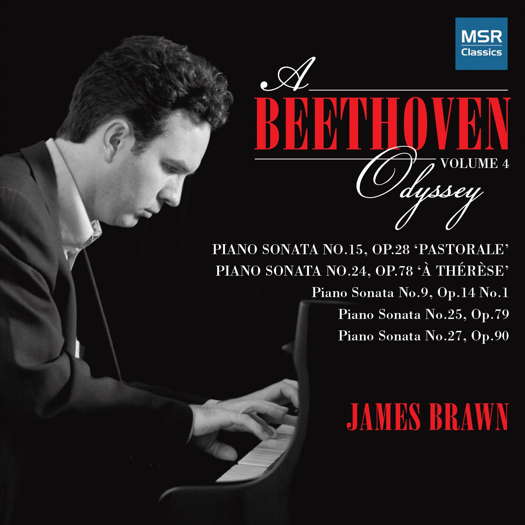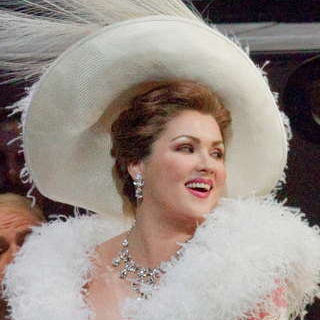- Marina Kondratyeva
- Elijah Moshinsky
- Daniel Pelton
- global warming
- Mícheál Ó Súilleabháin
- Bryan Drake
- Ritter
- Götz Friedrich
An Italian Creation
GIUSEPPE PENNISI listens to Giuseppe Carpani's Italian language version of Haydn's oratorio
On 15 January 2022, I went to Rome's Auditorium del Parco della Musica in order to listen to Haydn's La creazione del mondo - not Die Schöpfung or The Creation. The National Santa Cecilia Academy has included in its symphonic season a precious rarity: the Italian version of Haydn's work by barrister and musical organizer Giuseppe Carpani (1752-1825). The version was written in 1801, performed for the first time by the Roman Philharmonic Academy in 1825 and revived by the Santa Cecilia Academy in 1869 in a charity performance, 'in the Capitol's largest maximum hall' for the orphans of the cholera epidemic. At that time, it was customary to perform in the language of the country where the theatre or concert hall was located. Compared to many 'rhythmic versions' of works by Richard Wagner that leave something to be desired, the honest barrister Giuseppe Carpani has done a job that fits Haydn's score well and that allows listeners to appreciate the depth of the text.
It is known that Franz Joseph Haydn returned from London to Vienna with a libretto (by an unknown author) in English, taken from Milton's Paradise Lost. The libretto was promptly translated into German. The oratorio was performed for the first time in private form in the Schwarzenberg Palace conducted by the composer and with Antonio Salieri on the harpsichord. This is one of Haydn's great oratorios most applauded in the first half of the nineteenth century, also because of a religious inspiration that perfectly fits both the Catholic and the Protestant worlds. Even today, despite its complexity and the vast ensemble it requires, it is one of the most performed: from 1970 to now, only in the concerts seasons of the National Santa Cecilia Academy, it has been performed twelve times, always with great international conductors.
In my memory, I have performances in Washington, in the second half of the 1970s, by the National Symphony, conducted by Mstislav Leopoldovich Rostropovich, and, especially, that at the Teatro dell'Opera di Roma, on 31 December 1991, conducted by Giuseppe Sinopoli, with a stellar cast - June Anderson, Robert Swensen, Dawn Upshaw and Bernd Weikl - and with the chorus prepared by Norbert Balatsch.
The work is so well known that it does not need a presentation. In the first two parts (performed with a brief interruption but without interval), we listen to the dissolution of darkness and chaos, the birth of natural phenomena, of the plants' world, of the animal kingdom and finally of the human being. The third part is the love encounter of Adam and Eve. The creation of the world stops there; it does not enter the central part of Paradise Lost - the snake, the apple, the expulsion from Paradise - precisely because the oratorio is a hymn of thanksgiving to the Creator. or 'Fattor' in the translation by Giuseppe Carpani.
From the very start, you can feel that the baton of Sir John Eliot Gardiner is very different from that of other concert performers. It may seem slow, for example, to those accustomed to that of Leonard Bernstein on a successful CD in which the sounds are accentuated and an almost late romantic touch is given (with echoes of Mahler's Eighth Symphony) to what is the most refined Baroque. Gardiner delves into this Baroque to show how great elegance accompanies religious spirit. It reminded me of the conducting by Sinopoli thirty years ago. It was imbued with philosophy, as often when the Venetian conductor was on the podium. Gardiner shows, correctly, a different Baroque in the first two parts (where the description of natural phenomena and the rise of the plant and animal world prevails) from that of the third where the emphasis is on conjugal love, grateful to the Lord, but also very earthly. The reference to another performance by Gardiner is immediate: that of Monteverdi's trilogy taken around the world in 2017, with a stop in Italy at the Teatro La Fenice in Venice. The sounds, always well controlled in the first two parts, become soft in the third.
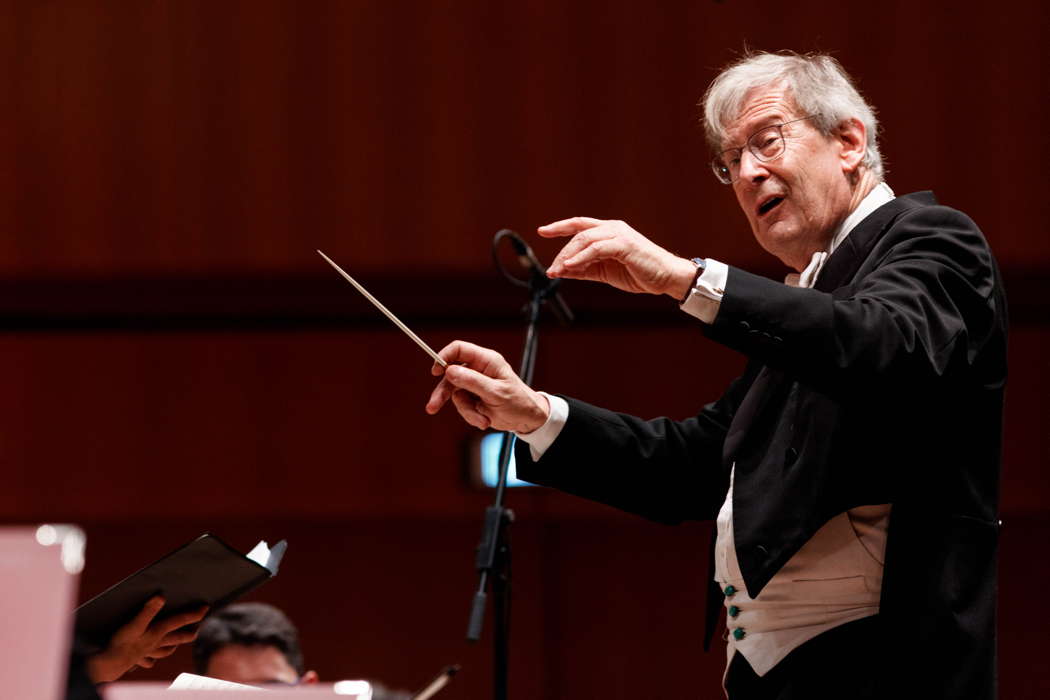
John Eliot Gardiner conducting Franz Joseph Haydn's La creazione del mondo in Rome. Photo © 2022 Riccardo Musacchio
The vocal parts were entrusted to a German soprano and an Italian tenor and bass baritone (coming, moreover, from the same school, the AsLiCo). The first, Lenneke Ruite, has a clear, transparent voice but had difficulties, especially in diction and phrasing, in the first half of the performance; she recovered in the long love duet of the second half. She is accustomed to singing lieder and operas but in theatres and concert halls much smaller than the large auditorium named after Santa Cecilia (conceived for an audience of three thousand). Giovanni Sala and Roberto Lorenzi were very good. The first is clearly already a mature Verdi tenor with a good centre register, a nice ring and excellent mezze voci. The second stands out for his phrasing and legato.
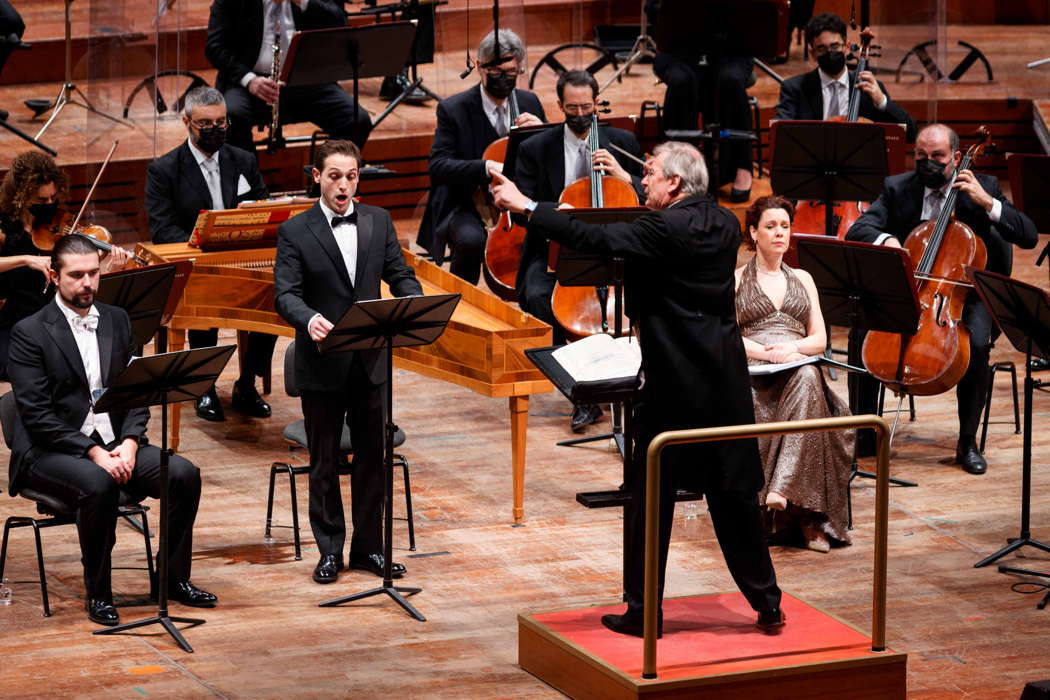
Vocal soloists Giovanni Sala, Roberto Lorenzi and Lenneke Ruite with John Eliot Gardiner conducting the orchestra of the Accademia Nazionale di Santa Cecilia in Giuseppe Carpani's Italian translation of Haydn's The Creation. Photo © 2022 Riccardo Musacchio
As always the chorus, placed in the gallery above the orchestra with very good stereophonic effects, was excellent.
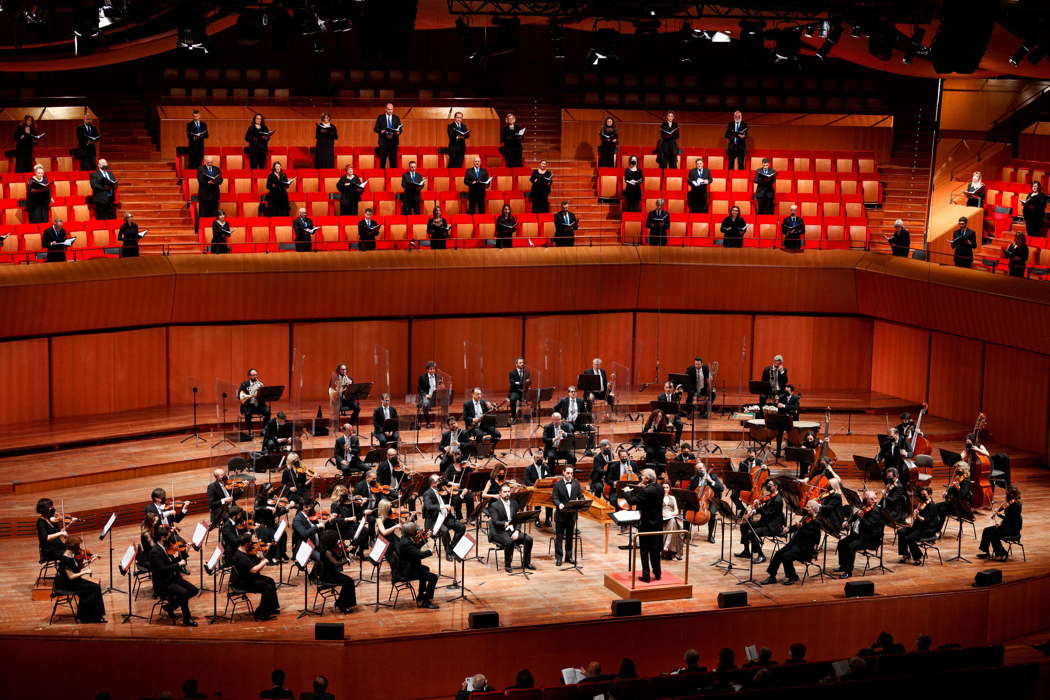
Choir, orchestra and soloists performing the Italian version of Haydn's The Creation in Rome. Photo © 2022 Riccardo Musacchio
The concert hall was fuller than usual, in these pandemic times, with ovations rather than applause.
Copyright © 17 January 2022
Giuseppe Pennisi,
Rome, Italy

ARTICLES ABOUT THE ACCADEMIA NAZIONALE DI SANTA CECILIA


